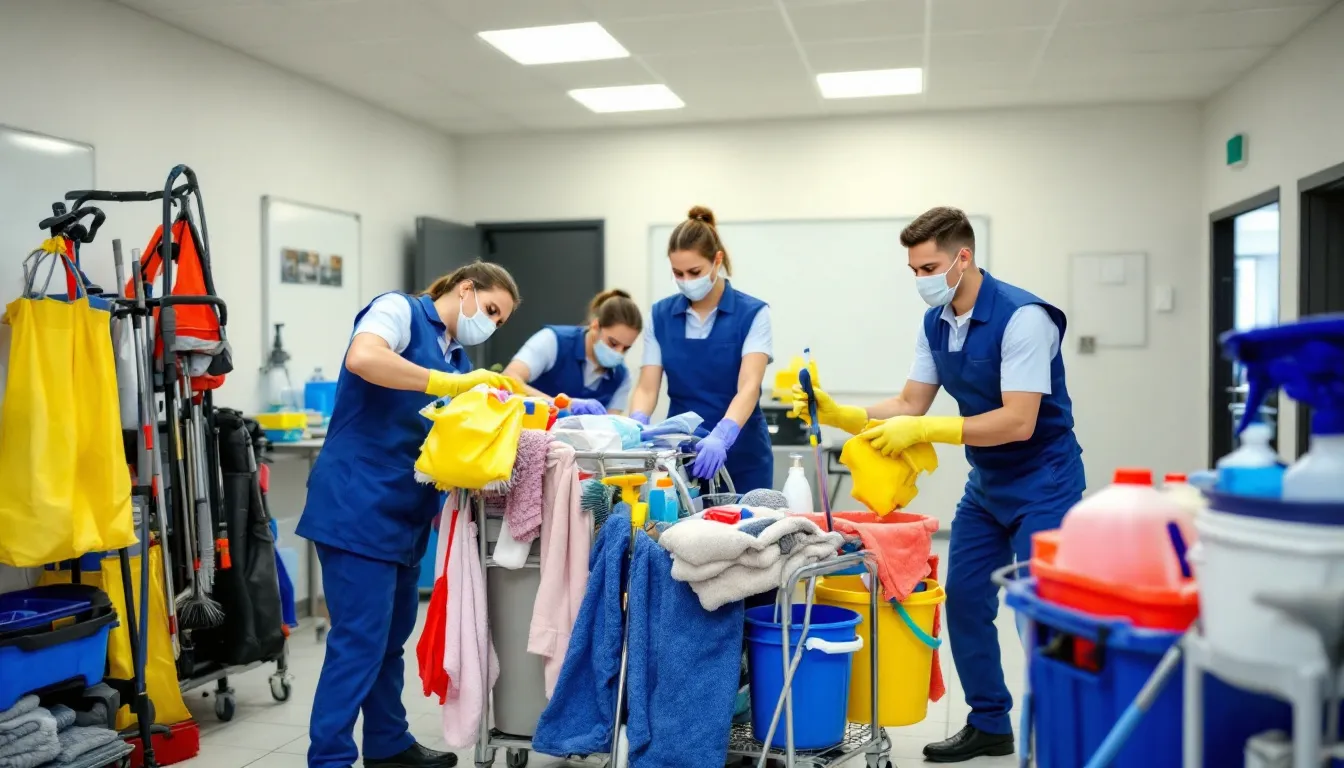Starting a cleaning business in South Carolina isn’t just about grabbing a mop and hoping for the best—it’s about building something that lasts. With the state’s economy growing and new residents flooding into Charleston, Columbia, and Greenville, the cleaning industry is ripe with opportunity. But here’s the truth: most people who start a cleaning business fail within the first year because they skip the fundamentals.
This isn’t another generic guide that treats South Carolina like every other state. This is your roadmap to building a thriving business that operates legally, serves customers professionally, and generates the revenue you deserve. Every step matters, every license counts, and every decision you make today shapes whether you’re still in business next year.
Let’s get you started the right way.
Quick Start Checklist for SC Cleaning Business
Before diving deep into each requirement, here’s your immediate action plan to get your cleaning business operational in South Carolina. This checklist gives you the essential steps to start serving clients within a few weeks:
- Register your business name with SC Secretary of State ($110 filing fee for LLC)
- Obtain business license from your local city/county (required in Beaufort, Charleston, Dorchester, Horry, Jasper, Marion, Orangeburg, Richland, and Sumter counties)
- Get general liability insurance ($500-$1,500 annually) and workers’ compensation if hiring employees
- Set up business bank account and accounting system for proper financial management
- Purchase basic cleaning equipment and supplies ($500-$1,000 for residential, $2,000-$5,000 for commercial cleaning)
- Develop pricing strategy and marketing plan targeting your specific services
- Create professional website and Google My Business listing for local visibility
This section provides immediate actionable steps to start operations quickly, but don’t rush through without understanding each requirement. The devil is in the details, and those details determine whether your cleaning business survives or thrives.

Research the South Carolina Cleaning Market
Understanding your market isn’t optional—it’s survival. South Carolina’s cleaning industry reflects the state’s rapid growth, but that growth isn’t evenly distributed. Smart business owners research where the money is before they invest their time and energy.
Identify Your Target Market
The cleaning services market in South Carolina varies dramatically by region and customer type. Here’s where the real opportunities lie:
Residential cleaning dominates in dual-income household areas throughout Charleston, Columbia, and Greenville metro areas. These customers typically pay $25-$50 per hour and value reliability over rock-bottom pricing. The coastal areas see seasonal spikes during tourist seasons, creating additional revenue opportunities.
Commercial cleaning thrives in growing business districts, particularly downtown Charleston and Columbia’s expanding corporate centers. These commercial clients often require contracts ranging from $0.10-$0.20 per square foot, with higher rates for specialized services like medical facilities or post-construction cleanup.
Specialized services command premium pricing in South Carolina’s booming real estate market. Post-construction cleaning for new developments pays significantly more than standard residential work, often $200-$500 per job depending on square footage and scope.
Vacation rental cleaning represents a goldmine in Myrtle Beach and Hilton Head areas, where property managers need reliable, fast turnaround cleaning between guests. These clients pay premium rates for same-day service and consistency.
Competitive Analysis
Know your competition before you compete. Research major competitors like Molly Maid and Merry Maids alongside local independent cleaning companies. Analyze their service offerings, pricing structures, and customer reviews to identify gaps in the market.
Most successful cleaning businesses in South Carolina differentiate through excellent customer service, specialized services, or targeting underserved geographic areas. The key is finding what your competitors aren’t doing well and doing it better.
Determine your unique value proposition early. Whether it’s eco-friendly products, flexible scheduling, or serving specific neighborhoods that larger companies ignore, your competitive advantage shapes everything from your marketing strategies to your pricing structure.
Choose Your Business Structure and Register in South Carolina
Your business structure affects everything from taxes to personal liability. Most cleaning business owners in South Carolina choose between sole proprietorship, limited liability company (LLC), or corporation, each with distinct advantages and requirements.
South Carolina Business Registration Requirements
Form an LLC through the SC Secretary of State for $110 filing fee. This business structure provides liability protection while maintaining operational flexibility. An LLC protects your personal assets if something goes wrong with your cleaning business.
Register your business name with the appropriate authorities. If operating under a name different from your legal entity, file a DBA (doing business as) with your county clerk’s office. This step is crucial for opening a business bank account and operating legally.
Obtain a Federal Employer Identification Number (EIN) from the IRS, even if you don’t plan to hire employees immediately. This number is required for tax purposes and opening business accounts.
Open a business bank account at a local South Carolina bank like South State or First Citizens. Keeping business and personal finances separate isn’t just good practice—it’s essential for tax compliance and professional credibility.
The registration process typically takes 7-10 business days when filed online through the SC Secretary of State portal. Choose a registered agent (this can be yourself or hire a service for $100-200 annually) to receive legal documents on behalf of your business.
Obtain Required Licenses and Permits in South Carolina
Here’s good news: South Carolina doesn’t require a state business license for cleaning businesses. However, that doesn’t mean you can skip licensing entirely. Local regulations vary significantly across the state.
City-Specific License Requirements
Most South Carolina cities and counties require their own business licenses, separate from state registration. The requirements and fees vary by location:
City/County | Annual Fee | Application Process | Renewal |
|---|---|---|---|
Charleston | $50 | Online at charleston-sc.gov | Annual |
Columbia | $30-$60 | bizlicense.columbiasc.net | Annual |
Greenville | $25 minimum | County Treasurer office | Annual |
Mount Pleasant | $35 | City clerk, renewable December | Annual |
Charleston requires a $50 annual business license through their online portal. The process is straightforward but must be completed before operating.
Columbia charges $30-$60 based on gross receipts, with applications processed through their online business license portal.
Greenville has a $25 minimum fee structure, with applications submitted to the County Treasurer’s office.
These business licenses are legally required to operate. Operating without proper licensing can result in fines, forced closure, and legal issues that destroy your reputation before you build it.
Contact your local county clerk’s office or local city hall to determine specific requirements for your operating area. Many counties offer online applications, making the process faster and more convenient.

Secure Insurance and Bonding
Insurance isn’t just protection—it’s credibility. Commercial clients won’t hire cleaning companies without adequate insurance coverage, and residential customers increasingly demand proof of insurance before allowing cleaners into their homes.
South Carolina Insurance Requirements
General liability insurance costs $500-$1,500 annually for $1 million coverage and protects against property damage, bodily injury claims, and legal fees. This coverage is non-negotiable for any successful cleaning business.
Workers’ compensation insurance becomes mandatory when you hire your first employee in South Carolina. Rates vary by classification but typically range from 0.5-2.5% of payroll for cleaning industry workers.
Commercial auto insurance is required if using vehicles for business purposes. Even if using personal vehicles for cleaning routes, notify your insurance company about business use to avoid coverage gaps.
Surety bonding costs $100-$300 annually for $10,000-$50,000 coverage and protects clients against theft by employees. Many commercial clients and upscale residential customers require bonded cleaning services.
Contact South Carolina-licensed insurance agents for competitive quotes. Companies like State Farm, Allstate, and Progressive offer business insurance packages specifically designed for cleaning businesses. Consider umbrella policies for additional liability protection as your business grows.
Don’t shop solely on price. The cheapest insurance often provides inadequate coverage when you need it most. Work with agents who understand the cleaning industry and can explain coverage options clearly.
Calculate Startup Costs and Secure Funding
Understanding your total cost before starting prevents cash flow problems that kill most small business ventures. Cleaning business startup costs vary significantly based on your target market and service scope.
Equipment and Supply Costs
Basic residential startup costs range from $2,000-$5,000 total investment, including:
- Cleaning supplies: $200-$500 (vacuum cleaners, mops, chemicals, microfiber cloths)
- Basic equipment: $300-$800 (commercial-grade vacuums, floor care tools)
- Insurance and licensing: $600-$1,200 (first year coverage and permits)
- Marketing and branding: $500-$1,500 (vehicle signage, website, business cards)
Commercial cleaning startup requires $10,000-$25,000 investment:
- Commercial equipment: $2,000-$5,000 (floor buffers, extractors, pressure washers)
- Vehicle and signage: $500-$2,000 for professional branding
- Initial supply inventory: $1,000-$2,000 for bulk purchasing
- Training costs and uniforms: $200-$500 for professional appearance
Monthly operating expenses typically run $500-$2,000 including insurance premiums, fuel costs, supply replenishment, and equipment maintenance.
Explore SBA loans through South Carolina banks and credit unions for larger equipment purchases. Many lenders offer small business loans specifically for service-based businesses with strong business plans.
Plan for additional costs that many new owners overlook: vehicle maintenance, equipment replacement, seasonal fluctuations in revenue, and emergency repairs. Successful cleaning business owners maintain cash reserves equal to 3-6 months of operating expenses.
Hire and Train Employees
Building a team transforms your cleaning business from a one-person operation into a scalable enterprise. However, hiring employees brings additional legal requirements and operational complexity.
Employment Law Compliance
South Carolina’s minimum wage is $7.25 per hour, but competitive cleaning wages range $12-$18 per hour to attract reliable employees. The cleaning industry faces high turnover rates, making competitive wages essential for retaining quality staff.
Register for unemployment insurance with the SC Department of Employment and Workforce when hiring your first employee. This registration must be completed before the employee starts work.
Implement background checks and drug testing policies to protect your business and clients. Many commercial clients require background-checked employees, and residential customers increasingly demand this verification.
File new hire reporting with the SC Department of Social Services within 20 days of hire. Comply with federal I-9 employment verification requirements to avoid immigration-related penalties.
Establish payroll systems that handle tax withholding, workers’ compensation premiums, and unemployment insurance contributions. Consider payroll services to ensure compliance and reduce administrative burden.
Develop comprehensive training programs covering cleaning techniques, safety procedures, customer service standards, and handling hazardous materials. Proper training reduces work-related injuries, improves service quality, and protects against legal issues.
Create employee handbooks defining policies, procedures, and expectations. Clear communication prevents misunderstandings and provides legal protection for your business.

Develop Marketing Strategy
Marketing isn’t an expense—it’s an investment in your business growth. Effective marketing combines digital strategies with traditional local outreach to build a steady stream of customers.
Digital Marketing for SC Market
Create a professional website optimized for local South Carolina search terms. Target keywords like “cleaning service Charleston,” “maid service Columbia,” and “house cleaning Greenville” to capture local search traffic.
List your business on Google My Business, Yelp, and Angie’s List immediately. These platforms drive local customers and provide credibility through reviews and ratings.
Run targeted Facebook and Google Ads focusing on specific South Carolina zip codes and demographics. Start with small budgets ($200-$500 monthly) and scale based on results.
Collect and showcase customer reviews aggressively. Positive reviews drive more business than any other marketing efforts. Implement systems to request reviews after each service and respond professionally to all feedback.
Partner with real estate agents and property managers for referral opportunities. These partnerships provide steady streams of move-in/move-out cleaning work and vacation rental maintenance.
Use door hangers and flyers in target neighborhoods, especially during spring cleaning season and before holidays. This traditional approach still works effectively for local service businesses.
Implement referral programs offering discounts or credits for customer referrals. Word-of-mouth marketing costs less and converts better than most advertising methods.
Track marketing efforts carefully. Measure which strategies generate the most customers and focus resources on what works best for your specific market area.
Operational Best Practices
Efficient operations separate successful cleaning businesses from those that struggle to survive. Systems, procedures, and quality controls determine whether your business grows or remains stuck as a one-person operation.
Growth and Expansion Strategies
Implement scheduling software to manage appointments, optimize routes, and track employee productivity. Modern cleaning businesses use technology to reduce operational costs and improve customer service.
Develop standardized cleaning checklists and quality control procedures for consistent service delivery. Customers pay for reliability, and systems ensure quality regardless of which employee performs the work.
Create billing systems with automated invoicing and payment processing. Online payment options improve cash flow and reduce administrative time spent collecting payments.
Establish customer service protocols for handling complaints, scheduling changes, and feedback. Professional communication builds customer loyalty and prevents small issues from becoming major problems.
Add specialized services like carpet cleaning, window washing, or pressure washing to increase revenue per customer. These services often command higher margins than standard cleaning work.
Expand to neighboring markets in North Carolina border areas or Georgia once your South Carolina operations are profitable and systematized.
Consider franchising opportunities once you’ve proven your business model and built strong operational systems. Franchising can accelerate growth while maintaining quality standards.
Develop commercial contracts with office buildings, retail chains, and medical facilities for steady monthly revenue. Commercial contracts provide predictable income that supports business growth.
Monitor key performance indicators like customer retention rates, average job value, employee productivity, and profit margins. Use this data to make informed decisions about pricing, staffing, and service offerings.

Conclusion
Starting a cleaning business in South Carolina offers excellent opportunities for entrepreneurs willing to do the work properly. The state’s growing population, strong economy, and business-friendly environment create ideal conditions for cleaning service success.
Success requires more than good intentions and cleaning supplies—it demands proper planning, legal compliance, and professional execution. Follow this guide’s steps for proper licensing, adequate insurance coverage, and effective marketing to build a business that lasts.
Focus on quality service, excellent customer service, and steady growth rather than trying to expand too quickly. The cleaning industry rewards consistency, reliability, and professional standards over flashy marketing or rock-bottom pricing.
Your cleaning business can become a thriving business that provides financial freedom and builds generational wealth. Start with the quick checklist, register your business properly, and take action today. South Carolina’s cleaning market is waiting for business owners who understand that success comes from doing things right from the beginning.
The only question remaining is whether you’ll be another cleaning business that struggles to survive or a successful cleaning business that dominates its market. The choice—and the opportunity—is yours.